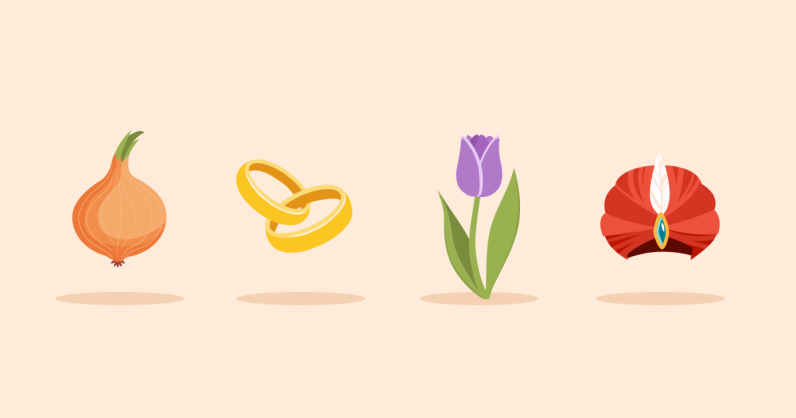Strange but True: Words With Surprising Relationships

As many of us now know from doing DNA tests, family trees don’t always have the root structures one might expect. The genetics of etymological relationships can sometimes yield surprises too. Words that seem unrelated can have common origins, and others that look closely related can turn out to have independent roots. If you browse the History notes in our dictionary, you’ll see for example that flour and flower both come from the Middle English flur (“flower”). By contrast, you’ll find that isle and island are not directly related. The modern English words just happen to look alike, and the false family resemblance got a boost in the 16th century when the written s of isle spread to island by association. This month’s Word Stories instalment investigates some English words that may surprise you in terms of how they are related—or unrelated.
onion/union
The roots of the word onion are found in imperial Latin, which used the word unio to describe a single-formed pearl and by whimsical extension a single-bulbed onion. The ultimate root of the term is therefore the word unus (“one”), which also lies behind English words like union, unity, and unique. The Latin noun unio developed into the Old French oignon, which Anglo-French passed on as uniun, ungeon, etc. The word first appears in English in the 14th century, in a wild variety of forms ranging from unyonn and ingan to honzon. As the centuries passed, the form onion took root, and eventually took over.
The meaning of the English word onion has also shifted. Some English speakers followed ancient practice by using the word to describe single pearls (R. Holme, The Academy of Armory, 1688). Others adopted the later French habit of calling bunions onions (D. Low, Chiropodologia, 1885). Still others have long used the label for any single-bulbed plant (S. L. Everist, Poisonous Plants of Australia, 1974). In everyday modern English, though, the word onion always refers to a cultivated species of Allium cepa—the garden varieties of onion grown all over the world for the pungent zip they add to cooking.
tulip/turban
The wrapped cloth headdress known as a turban has been worn by men in the Middle East since antiquity, and in time spread as far as South Asia and North Africa. The headgear’s original Persian name dōlbănd lies behind both turban and tulip, apparently by way of its Turkish derivative tülbend (“turban”).
The phonetic similarity of an l sound and a flapped r sound allowed the Turkish word to come into Italian as turbante (“turban”), which seems to have passed into French and thereby into English as turban. The i sound preserved in tulip, on the other hand, seems to be derived from the Turkish variant tülibend, which gave rise to the French tulipan and thereby the archaic English tulipan (“tulip”). The name of the headdress appears to have been applied to the flower based on the rounded, bulbous shape they share. Over time, though, this English name for the flower was crowded out, along with similar variants like tulipa, tulpia, and tulipant. By the end of the 17th century, the shorter modern English form tulip had conquered the field, encouraged by the parallel victory of the French variant tulipe.
male/female
The word male came into English as both a noun and an adjective around the turn of the 14th century. Its roots stretch back through the Middle French male/masle/mascle (“male”) to the Latin adjective masculus (“masculine”) and thereby the Latin noun mās (“man”). The English word female is similarly first attested in the 14th century, and like male it draws on French and thereby Latin. The Old French femele (“female”) was a derivative of the Latin femella (“a young or small woman”)—a diminutive form of the Classical Latin femina (“woman”). The roots of the word female can, however, be traced back further than those currently known for male. The Latin femina was derived from the Proto-Italic fēmanā or thēmanā (“woman”), and thereby from the Proto-Indo-European root dheh- (“to suckle a baby”). While the English words male and female may look intimately connected at first glance, then, they actually evolved independently from separate origins.
sore/sorrow/sorry
The modern English noun sorrow comes to us from the Old English noun sorg (“sorrow”) and thereby the Proto-Germanic verb surgō (“to worry” or “to suffer”). Despite this etymological link to suffering, and despite the semantic similarity between feeling the pain of sorrow and feeling the pain of being sore, the word sorrow is not actually related to the word sore.
The noun sore and the adjective sore come from the separate Old English etymon sār (“pain” or “wound”), which was based in turn on the old Germanic word sairaz (“ill”). The earliest sense of sore (first attested in the 9th century) is the literal one that still dominates today: if you have a sore or if your body feels sore, it hurts. In the 16th century, the adjective took on figurative senses like “serious” and “difficult to bear”. A person might be guilty of a sore offence (Bishop Edmund Bonner, Homilies, 1555) or be laid low by sair affliction (Ninian Winzet, Works, 1562). The looser figurative sense of “angry” or “irritable” is associated in popular culture with American slang (“Don’t get sore,” a kid in a 1950s TV show might say), but its use is actually quite old. Alexander Pope used it, for example, in his Dialogue 2 (1738). It survives today, notably in the expression sore loser, meaning a person who takes defeat irritably. Sore was also used casually at times in the 19th century to mean “sorry” in the pejorative sense: a sore hand at cards was a sorry, i.e. pitiful player. This slang connection with sorry did not last, though, and sore is not directly related to sorry.
The adjective sorry comes to us from the Proto-Germanic sairagaz, via the Old English sārig (both of which mean “sad”). In works like Beowulf, the word sārig means “sorrowful”. The modern sense of sorry as “remorseful” did not take long to emerge, though—the poem Judgment Day (written down in the late 10th century) mentions the idea of being sarig for one’s sins, for example. Around the same time, people started to use sorry to describe things that cause pain or sorrow, like a sorry war or a sorry love affair. This sense also survives today in phrases like a sorry state of affairs. A third derivative sense that still survives in informal contexts emerged in the 14th century—the use of sorry to mean pathetic or despicable: When an angry person tells you, “Get your sorry behind out of here”, they’re not referring to any remorseful feelings you may be having. They may, however, be threatening feelings of soreness or sorrow if you don’t comply.




